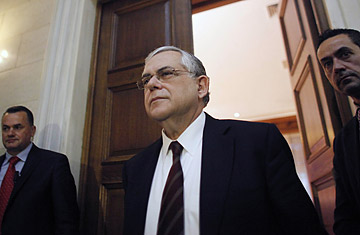
Prime Minister Lucas Papademos arrives for a meeting in Athens with the leaders of the three parties backing Greece's coalition government on Feb. 5, 2012
(2 of 2)
Panos Bessis, 42, a cameraman at the TV station, says he knows of colleagues who are now homeless because they've gotten kicked out of their apartments after falling behind on their rent. He says these colleagues sleep at the station, which the workers have occupied in a sit-in protest to force the owner to pay them. Bessis worries that he may find himself in the same situation: because the station hasn't paid him for so long, he's fallen behind on his mortgage. A recent poll found half of Greek homeowners saying they won't be able to pay their mortgages this year. "My wife hasn't been able to find a job for three years, and we also have a 5-year-old daughter," Bessis says. "Our savings have run out, and our options are running out too."
Bessis and other Greeks place the blame for Greece's woes squarely on the shoulders of their politicians. Many politicians, including former Prime Minister George Papandreou, can't walk in public without bodyguards. Others are pelted with yogurt, flour and eggs by angry constituents. At demonstrations, some protesters create makeshift gallows and scream that the politicians should be hanged. PASOK, the center-left party that ran Greece until November, has borne the brunt of the hatred because it introduced austerity measures after revealing that the previous ruling party, New Democracy, had lied about the deficit. A special prosecutor has even said Papandreou should be investigated for artificially inflating the deficit to allow austerity.
In this toxic atmosphere, elections could take place as early as April. Politicians are already campaigning, trying to distance themselves from austerity. Following the deadlocked meeting on Feb. 5 with interim Prime Minister Lucas Papademos, two of the three coalition leaders tried to position themselves as saviors of the people. Antonis Samaras, who leads the center-right New Democracy party and could be the country's next Prime Minister, said he was standing up to lenders to save the country from more recession. Giorgos Karatzaferis, who leads the hard-right LAOS party, said he was trying to stop the spread of a revolution.
Meanwhile, the quiet and wonky Papademos, a former central banker and Harvard professor with no political experience, is trying to navigate the fight club of Greek politics to carry out his mandate of saving the country from a messy default, which could lead to an exit from the euro zone. To do so, he must salvage both the bailout and the bond-swap deal to reduce the debt by at least 50%. Both deals must happen for Greece to have the money to pay off bonds that mature next month.
Even if Papademos persuades the coalition to sign off on the new bailout, he must then face Parliament, which also must approve the deal. In addition to slashing the minimum wage, the coalition government announced Feb. 6 that it would cut 15,000 civil service jobs this year.
Parliament will, of course, face the same tough choices as the coalition leaders. It too faces a public that resents austerity but overwhelmingly wants to stay in the euro zone. "It feels like we are damned either way," says Petros Koutsovoulos, 36, who runs a small shop in Plaka that sells handmade products fashioned out of the wood of olive trees. His business has dropped in half since the crisis. "If we give up and go back to the drachma, will it be a new start?" he says. "Or will it be the beginning of a poverty we can't even imagine?"
